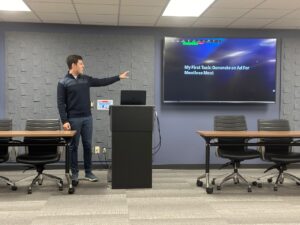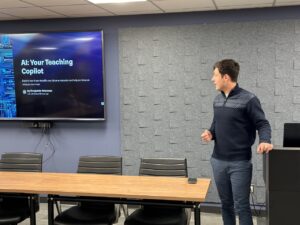
In the artificial intelligence (AI) revolution, the traditional landscape of education is undergoing profound changes. With generative AI tools like ChatGPT, anyone can access tools that generate human-like text based on endless possibilities of questions. As AI continues to permeate every aspect of our lives, its integration into education is an inevitable part of the future of learning. At the heart of this transformation in the School of Journalism and Mass Communication are the people: students and educators who have come together to advance educational opportunities.
The AI revolution embodies the rapid advancement and widespread use of AI technologies, evidenced by the almost $200 billion global AI market. Moreover, according to MITSloan Management Review, 83% of companies claim that AI is a strategic priority in their business plans. Despite pervasive concerns about AI’s potential to replace human jobs and increase unemployment, it is essential to recognize that AI can be harnessed for innovation in ways that enhance our experiences.

As we navigate the impacts of AI, one student stands out in his advocacy for AI use in education. Ben Newman, a senior in the J-School studying strategic communication, is not your typical student. Beyond journalism and communication, Newman has a passion for technology and what it can do for us. From a young age, he has leveraged technological tools to amplify his creative expression, making music with GarageBand and crafting stop-motion videos with simple apps. When AI-powered tools like ChatGPT emerged, he saw it as a natural extension of his interest.
“I’ve always been technologically enabled and loved using technology in order to punch above some of my abilities in creative execution to achieve my vision. My interest in AI is part of a continuation of me using technological tools that help me be creative,” Newman said.
His journey with AI led to experiments with various tools. Newman created an AI-generated t-shirt shop and advised businesses to integrate AI in their practices. This blend of tech-savvy and strategic thinking positioned him as a valuable asset in navigating the complexities of AI.

Newman has been doing speaking engagements with different teams in the businesses that he worked with since last August, presenting to heads of marketing, HR teams and CEOs. Last semester, he brought this skill to the university and gave a presentation to teachers in the J-School about the uses of AI and the democratization of creativity.
“I realized that there was an opportunity to tailor that [business] presentation with all the introduction to AI ultimately to a group of educators,” he said.
Newman’s collaboration with faculty not only demonstrated the value of AI in education but also highlighted the importance of collaboration and innovative thinking in achieving the J-School’s primary goal: helping students prepare for the world ahead.
As the J-School responds to the demands of the AI revolution, many instructors, including Helen Firstbrook Franklin Professor of Journalism and Mass Communication Michael Wagner, are integrating this new form of learning into their classes.
 Professor Wagner challenges the notion that AI is accurate and unbiased. For one assignment, he asks his class to type a question into ChatGPT about certain research and then fact-check whether the research publication it cites actually exists.
Professor Wagner challenges the notion that AI is accurate and unbiased. For one assignment, he asks his class to type a question into ChatGPT about certain research and then fact-check whether the research publication it cites actually exists.
“A lot of times ChatGPT will hallucinate publications that don’t exist,” Wagner said, “Whatever AI produces is a function of who creates that particular system.”
As students graduate and the job market evolves, Wagner is determined to continue to prepare his students for the jobs of tomorrow. “The future of education will change in the AI revolution. It expands the options available to students in some ways and contracts the options available to folks in other ways,” Wagner said.
While classrooms adapt to the evolving landscape shaped by AI, educators like Professor Wagner are navigating the complexities and challenges of integrating this technology into their teaching. Reflecting on his approach and the primary goals of the J-School, Wagner said: “We’re trying to give students a set of tools to learn, to write, to think, to assess the quality of information, to rank the value of information, so that when a new job comes along in 15 years, they have the skill set that’s going to help them succeed in that new area.”
While some people view the AI revolution as a frightening future that threatens job security, both Newman and Wagner believe that the integration of AI in education serves as a catalyst for innovation. As students and educators embrace this shift, they are not merely preparing for the future but shaping it.